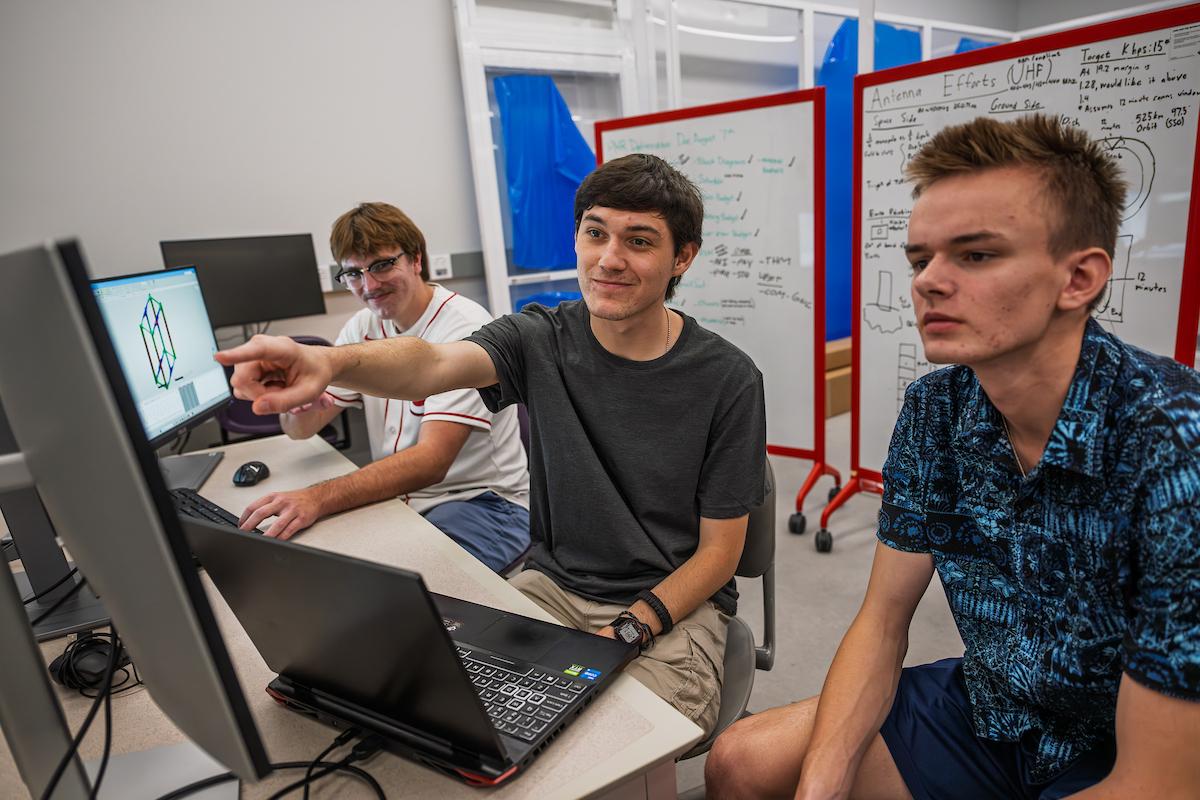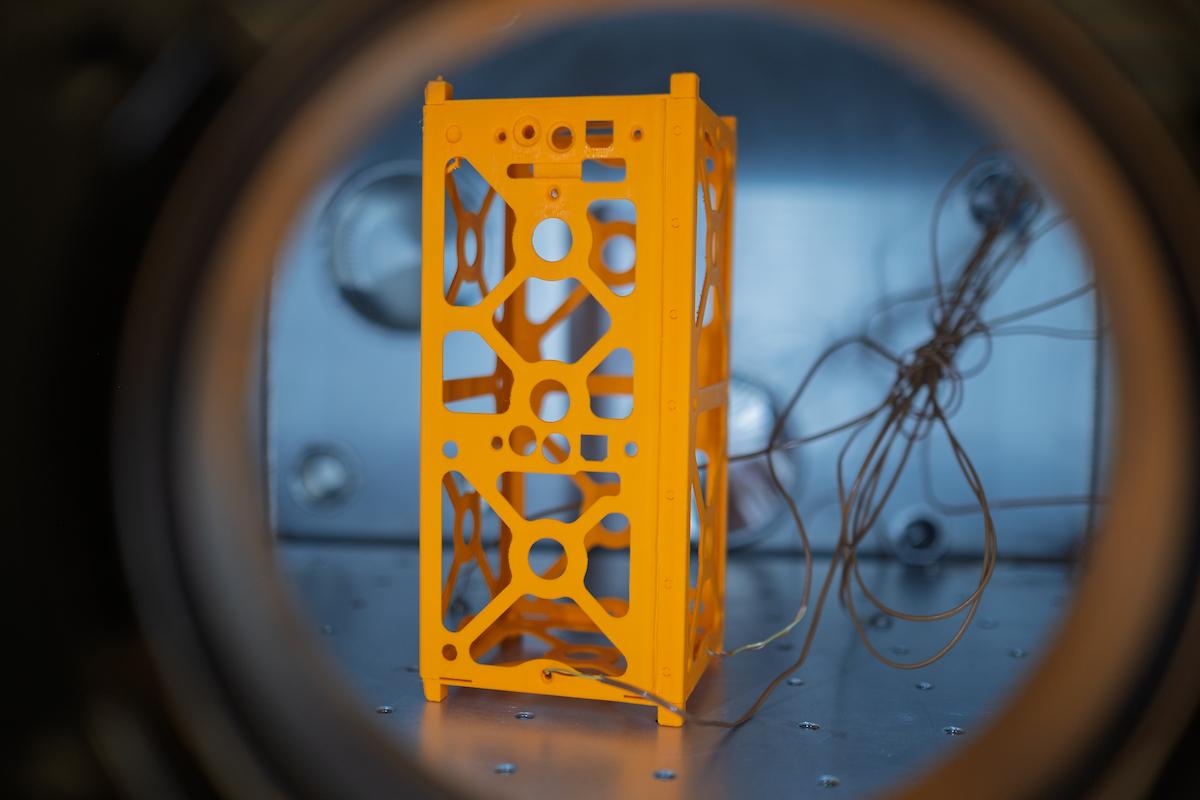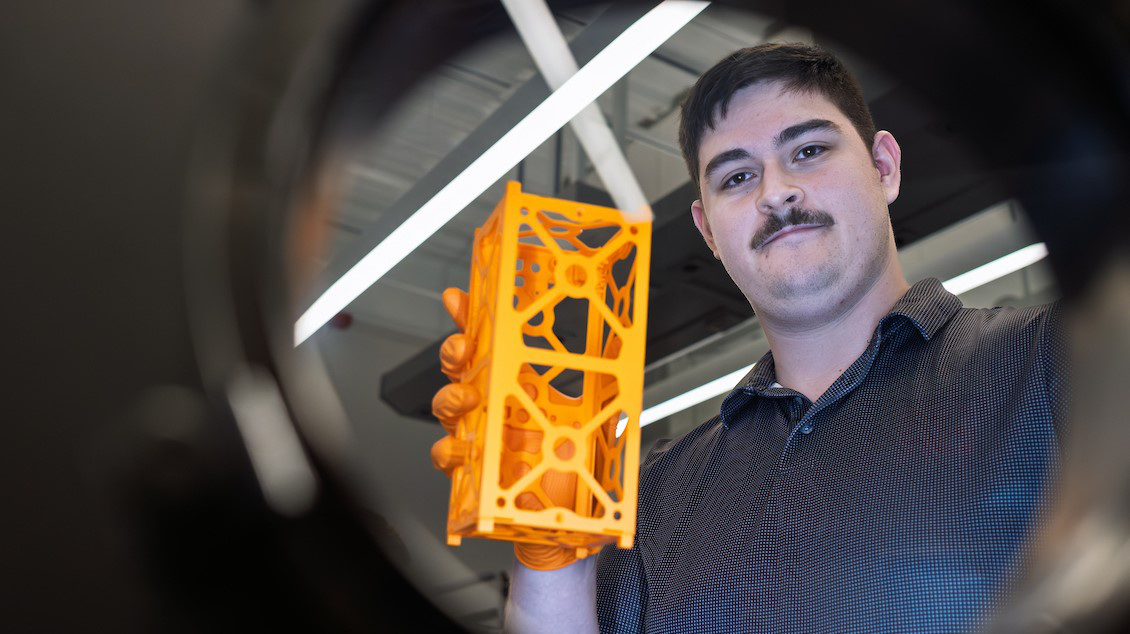In the Spacecraft Design Lab on the lower level of °µÍř˝űÇř’s College of Aeronautics and Engineering, graduate student Mark Stallone works under the direction of assistant professor and faculty advisor Jeff Balcerski, Ph.D., to build a small satellite that may one day be launched into space.
Stallone, who is a 2025 graduate of °µÍř˝űÇř with a bachelor’s degree in aerospace engineering, is among a group of 35 °µÍř˝űÇř undergraduates and nine graduate students in the AstroFlashes space exploration club who are designing, building and testing satellites, spacecraft components and competing in space engineering challenges.
The satellite under current development is a “6U” (six unit) CubeSat, a rectangular spacecraft with dimensions of 10 x 22.63 x 36.6 centimeters. They are typically built from lightweight yet strong aluminum alloys that can withstand the harsh conditions of launch and space.
°µÍř˝űÇř students are building this satellite as part of the , a competitively funded program sponsored by the Air Force Research Laboratory, which awarded 11 universities two-year awards to build a flight-ready satellite, according to Balcerski, an assistant professor in the School of Engineering who leads the Spacecraft Design Lab. Students spend two years planning and building the payload and once it is complete, it will go through a formal review process to determine if it will be awarded a flight to orbit to deploy and operate the satellite in a February 2026 launch.
°µÍř˝űÇř’s satellite will be used to monitor harmful algal blooms in the western basin of Lake Erie, a collaboration with °µÍř˝űÇř’s Department of Earth Sciences.
Stallone spoke with °µÍř˝űÇř Today about some of the tests that the satellite will go through in the Spacecraft Design Lab.
°µÍř˝űÇř Prepares Students for Careers in the Aerospace Industry
°µÍř˝űÇř’s spacecraft curriculum and activities are relatively new in the College of Aeronautics and Engineering, Balcerski said. The lab is part of space-related research and student-driven activities to build and compete for awards to build satellites and other space-related technologies.
The lab contains different components that are needed to safely build a satellite and qualify it for space, such as a thermal vacuum oven, to expose the spacecraft to the dramatic pressure and temperature swings in a launch and space environment, and a Helmholtz cage, which simulates the Earth’s magnetic field at orbital altitudes. An ISO-7 clean room is under construction so that the pieces of the spacecraft can be assembled without contamination.
Students engaged in the lab develop in-demand aerospace skills, including mission planning, proposal development, prototyping and fabrication, and ultimately launch and in-space operations of small satellites.

“The program is important not only for developing our students but the nation and the world,” Balcerski said. The space economy is growing exponentially. It’s projected to reach over a trillion dollars by 2032. To have our engineering students to be able to participate in that when they leave school is an important thing. Employers are looking for students with experience, experience with flight hardware and spacecraft design experience. That is exactly what we are offering them through this program and facility.”
The Spacecraft Design Lab serves as a nexus for building a coalition of researchers from broad intellectual backgrounds to address challenges in space flight, exploration and habitation in ways that engage and inspire the public and research communities alike.
°µÍř˝űÇř Students Looking Forward to the Future
Olivia Voyzey, a second-year aerospace engineering master’s student from Twinsburg, Ohio, plays a project management role for the Spacecraft Design Lab. Voyzey earned her bachelor’s degree in aerospace engineering from °µÍř˝űÇř in May 2025.

Her love of aerospace engineering began when she was a child attending the Cleveland Air Show with her family. She decided to attend °µÍř˝űÇř because it is close to home and offered her an aerospace engineering program.
“I fell in love with the jets – just the sound, the speed, all of it,” she said. “And I was determined to find out how they worked one day. “Being young and ferocious, I needed to know how they worked immediately. So throughout middle school and high school, I would find different avenues to get to that end point, and I came across aerospace engineering.”
In 2024, senior aerospace engineering major Andrew Pertz was one of the students who established the AstroFlashes club and one of the first student researchers in the Spacecraft Design Lab. The sky is the limit for Pertz, who went from wanting to become a firefighter to now wanting to earn a doctorate.
“The cool thing about °µÍř˝űÇř is there is so much mobility to make something that you want it to be,” Pertz said. We’re going places where °µÍř˝űÇř Students have never been.”

